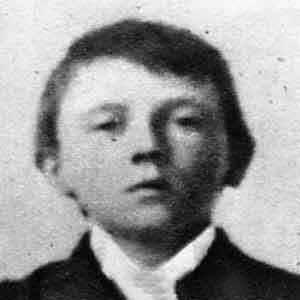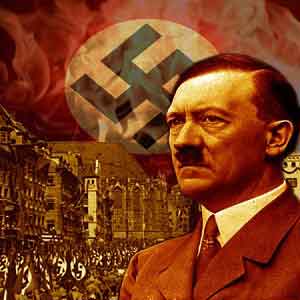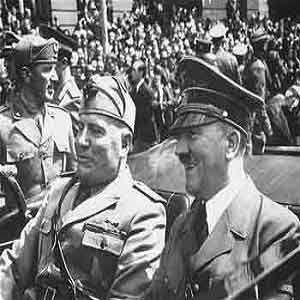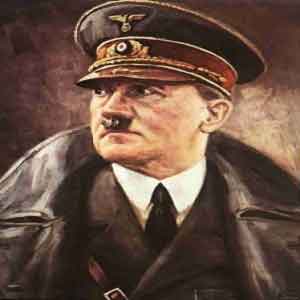Adolf Hitler
Introduction
Adolf Hitler German(20 April 1889 - 30 April 1945) was an Austrian-born German politician and the leader of the National Socialist German Workers Party. He was chancellor of Germany from 1933 to 1945 and dictator of Nazi Germany (as Fuhrer und Reichskanzler) from 1934 to 1945. Hitler was at the centre of the founding of Nazism, the start of World War II, and the Holocaust.
Growing up
A decorated veteran of World War I, Hitler joined the German Workers' Party, precursor of the Nazi Party, in 1919, and became leader of the NSDAP in 1921. In 1923, he attempted a coup d'tat, known as the Beer Hall Putsch, in Munich. The failed coup resulted in Hitler's imprisonment, during which time he wrote his memoir, Mein Kampf (My Struggle). After his release in 1924, Hitler gained popular support by attacking the Treaty of Versailles and promoting Pan-Germanism, antisemitism, and anticommunism with charismatic oratory and Nazi propaganda. After his appointment as chancellor in 1933, he transformed the Weimar Republic into the Third Reich, a single-party dictatorship based on the totalitarian and autocratic ideology of Nazism. His aim was to establish a New Order of absolute Nazi German hegemony in continental Europe.
As a child, Adolf clashed frequently with his father. Following the death of his younger brother, Edmund, in 1900, Adolf became detached and introverted. In addition to his interest in art, Hitler showed an early interest in German nationalism, rejecting the authority of Austro-Hungary. This nationalism would become the motivating force of Hitler’s life.
At the outbreak of World War I, Hitler applied to serve in the German army. He was decorated for bravery, receiving the Iron Cross First Class and the Black Wound Badge. Hitler was shocked by Germany's surrender in 1918. Like other German nationalists, he believed that the German army had been betrayed by civilian leaders and Marxists. He found the Treaty of Versailles degrading.
After World War I, Hitler returned to Munich and continued to work for the military as an intelligence officer. While monitoring the activities of the German Workers’ Party (DAP), Hitler adopted many of the anti-Semitic, nationalist and anti-Marxist ideas of DAP founder Anton Drexler. Hitler personally designed the party banner, featuring a swastika in a white circle on a red background. Hitler soon gained notoriety for his vitriolic speeches against the Treaty of Versailles, rival politicians, Marxists and Jews. In 1921, Hitler replaced Drexler as NSDAP party chairman.Hitler's vitriolic beer-hall speeches began attracting regular audiences. Hitler announced at a public gathering that the national revolution had begun and declared the formation of a new government. After a short struggle including 20 deaths, the coup, known as the “Beer Hall Putsch,†failed. Hitler was arrested three days later and tried for high treason. He served a year in prison, during which time he dictated most of the first volume of Mein Kampf (‘My Struggle’) to his deputy, Rudolf Hess. The book laid out Hitler's plans for transforming German society into one based on race.
The Rise of Hitler
The Great Depression in Germany provided a political opportunity for Hitler. Germans were ambivalent to the parliamentary republic and increasingly open to extremist options. In 1932, Hitler ran against Paul von Hindenburg for the presidency. Hitler came in second in both rounds of the election, garnering more than 35 percent of the vote in the final election. The election established Hitler as a strong force in German politics. Hindenburg reluctantly agreed to appoint Hitler as chancellor in order to promote political balance.
Hitler used his position as chancellor to form a de facto legal dictatorship. The Reichtag Fire Decree, announced after a suspicious fire at the Reichtag, suspended basic rights and allowed detention without trial. Hitler also engineered the passage of the Enabling Act, which gave his cabinet full legislative powers for a period of four years and allowed deviations from the constitution.
Having achieved full control over the legislative and executive branches of government, Hitler and his political allies embarked on a systematic suppression of the remaining political opposition. By the end of June, the other parties had been intimidated into disbanding. On July 14, 1933, Hitler's Nazi Party was declared the only legal political party in Germany.
Military opposition was also punished. The demands of the SA for more political and military power led to the Night of the Long Knives, which took place from June 30 to July 2, 1934. Ernst Röhm and other SA leaders, along with a number of Hitler's political enemies, were rounded up and shot.
The day before Hindenburg’s death in August 1934, the cabinet had enacted a law abolishing the office of president and combining its powers with those of the chancellor. Hitler thus became head of state as well as head of government, and was formally named as leader and chancellor. As head of state, Hitler became supreme commander of the armed forces. He began to mobilize for war. Germany withdrew from the League of Nations, and Hitler announced a massive expansion of Germany’s armed forces. Between 1939 and 1945, Nazis and their collaborators were responsible for the deaths of 11 million to 14 million people, including about 6 million Jews, representing two-thirds of the Jewish population in Europe.
World War II
In 1938, Hitler, along with several other European leaders, signed the Munich Agreement. The treaty ceded the Sudetenland districts to Germany, reversing part of the Versailles Treaty. As a result of the summit, Hitler was named Time magazine's Man of the Year for 1938. This diplomatic win only whetted his appetite for a renewed German dominance. On September 1, Germany invaded Poland. In response, Britain and France declared war on Germany.
Hitler escalated his activities in 1940, invading Scandinavia as well as France, Luxembourg, the Netherlands and Belgium. Hitler ordered bombing raids on the United Kingdom, with the goal of invasion. Germany’s formal alliance with Japan and Italy, known collectively as the Axis powers, was signed to deter the United States from supporting and protecting the British.
On June 22, 1941, Hitler violated a non-aggression pact with Joseph Stalin, sending 3 million German troops into the Soviet Union. The invading force seized a huge area before the German advance was stopped outside Moscow in December 1941.
On December 7, Japan attacked Pearl Harbor in Hawaii. Hitler was now at war against a coalition that included the world's largest empire (Britain), the world's greatest financial power (the U.S.) and the world's largest army (the Soviet Union).
Facing these odds, Hitler's military judgment became increasingly erratic. Germany's military and economic position deteriorated along with Hitler's health.Germany and the Axis could not sustain Hitler’s aggressive and expansive war. In late 1942, German forces failed to seize the Suez Canal. The German army also suffered defeats at the Battle of Stalingrad and the Battle of Kursk. On June 6, 1944, the Western Allied armies landed in northern France. As a result of these significant setbacks, many German officers concluded that defeat was inevitable and that Hitler's denial would result in the destruction of the country. By early 1945 Hitler realized that Germany was going to lose the war. The Soviets had driven the German army back into Western Europe, and the Allies were advancing into Germany. After midnight on April 29, Hitler married his girlfriend, Eva Braun, in a small civil ceremony in his Berlin bunker. Later that afternoon, Hitler was informed of the assassination of Italian dictator Benito Mussolini. Hitler and Braun committed suicide the following day. Their bodies were carried to the bombed-out garden behind the Reich Chancellery, where they were burned. Berlin fell on May 2.
Hitler’s political program had brought about a world war, leaving behind a devastated and impoverished Eastern and Central Europe, including Germany. His policies inflicted human suffering on an unprecedented scale and resulted in the death of an estimated 40 million people, including about 27 million in the Soviet Union. Hitler's defeat marked the end of a phase of European history dominated by Germany, and the defeat of fascism. A new ideological global conflict, the Cold War, emerged in the aftermath of World War II.




